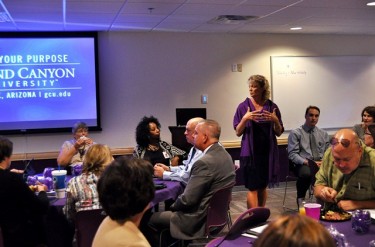By Michael Ferraresi
GCU News Bureau
Grand Canyon University announced a new education initiative Wednesday to nearly 50 Arizona K-12 school officials as part of the University’s ongoing effort to address the state’s shortage of high-quality teachers.
The Lopes Leap to Teach program, a joint effort of GCU’s College of Education and office of Strategic Educational Alliances, includes plans for a clinical practice expo and networking event in January where Arizona school officials may recruit GCU students who’ve recently completed student-teaching assignments. They also want to connect districts with students needing to complete practicum hours in classrooms and alumni searching for job opportunities.
The University also aims to partner with new school districts to connect top student teachers to opportunities at schools with vacant positions. Also, GCU announced a 5 percent tuition reduction for parents of children in its participant K-12 districts who might like to become teachers.
By next year, GCU hopes to have an even stronger network of local schools with access to its top future teachers, many of whom would rather teach close to home than move out of state for jobs.
“It’s a passion of ours and we’re working really hard to get those teacher candidates out there to you, and to have them well prepared,” College of Education Dean Dr. Kimberly LaPrade told the group.
Visitors to campus Wednesday included school district superintendents, principals and administrators from around the Valley and from as far away as Payson and Maricopa, in addition to some from charter and private schools. For many, the teacher shortage impacts students and their families each year — and GCU is prepared to provide a direct pipeline to high-quality, well-trained teachers to jump quickly into open positions.
According to the Arizona Department of Education, the state has about 95,000 certified teachers, though only about 52,000 are teaching this year. Experts cite factors such as low entry-level salaries and a lack of professional development opportunities in the state’s struggle to retain quality K-12 teachers.
At the Wednesday meeting, school administrators received copies of “Addressing a Shortage of High Quality Teachers: An Escalating Dilemma For Arizona Schools,” an education policy paper by GCU visiting professor Dr. Gerald Tirozzi,which was published through the College of Doctoral Studies in April. In the paper, Tirozzi, a former assistant secretary of elementary and secondary education at the U.S. Department of Education, cited the need for policymakers and other stakeholders to urge reforms in the Arizona Legislature in 2015.
Dr. Beverly Hurley, GCU’s director of academic partnerships, said the “bashing” of Arizona public school teachers and “lack of support from administrators” — common trends referenced in Tirozzi’s research — have over the past decade led the state’s teachers to cope with salaries that “have not kept pace with the overall salary increases for (many) other professions.”
Lopes Leap to Teach aims to address common issues facing Arizona’s schools and the teachers GCU prepares to lead students at those schools. Events like a GCU career fair in December and the clinical practice expo in January are designed to introduce students to schools in need of their services, and vice versa. GCU leaders believe those types of events will drive awareness about the need for teachers and promote openness about schools or districts with shortages.
“Maybe that will help drive up salaries, because competition can do that,” said Hurley, a former West Valley school superintendent.
The College of Education has 159 students currently in student-teaching roles who plan to graduate this spring, so school districts officials attending upcoming events through Lopes Leap to Teach will have opportunities to meet many GCU teaching candidates at once. Additionally, partner schools will have the opportunity to post opportunities on GCU’s online job board managed by Career Services.
Britt Chandler, associate vice president in the College of Education, said Lopes Leap to Teach has been in the works for several months. He and others solicited feedback from University staff and other stakeholders to determine how to build new connections for new participant schools.
“We have a large partner network, but a lot of times the only time they would reach out is when they’d have a shortage,” Chandler said.
“Now rather than them waiting to come to us, we’re trying to be more proactive, have them come out, and give them the opportunity to reach as many (students) as possible.”
Reach Michael Ferraresi at [email protected] or 602-639-7030.




































































